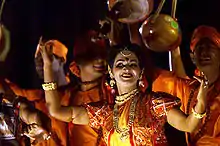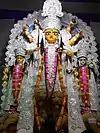Dhamail
Dhamail, variant of Dhamal, is a form of folk music and dance originated in Sylhet, Bangladesh. It is practiced in the erstwhile sylhet Division in Bangladesh and in areas influenced by the Sylheti culture such as Cachar, Karimganj and Hailakandi Districts of Assam, parts of Tripura and parts of Shillong, India. It accompanies the use of mirdanga, kartals and many other musical instruments which are usually played by the males while the dance is being performed. This dance form is similar to musical chairs, where one by one the dancers are removed by the dancers who can dance very fast as the beats gear up the speed. This dance form mainly relates the love of Radha and Krishna and the inner significance of this dance form is that the newly wedded couple must unite their souls in such fashion.
| Music of Bangladesh | |
|---|---|
 | |
| Genres | |
| Specific forms | |
| Religious music | |
| Ethnic music | |
| Traditional music | |
| Media and performance | |
| Music awards | |
| Music festivals | |
| Music media | Radio
Television Internet |
| Nationalistic and patriotic songs | |
| National anthem | Amar Shonar Bangla |
| Other | Notuner Gaan (National March) Ekusher Gaan (Ode to the Language Movement) |
| Regional music | |
| Related areas | |
| Other regions | |
The song and dance is mainly performed by the womenfolk during marriages and other auspicious occasions. The ladies moves in circle, clapping their hands to the beat of the music. The songs are first sung by the leader and then the others join the chorus. The lyrics mainly relate to Shyam (Krishna) and Radha. Gradually the tempo and dynamics increase to a peak. Breaks are then given so that the ladies can have paan and shupari and/or tea. Sylheti folk music composer Radha Raman and Arkum Shah have been cited as having introduced the dhamail dance tradition in Sylhet region.[1]
References
- Mahmud, Jamil (2008-04-03). "Radharaman Utsab '08 at TSC". The Daily Star. Retrieved 2009-01-28.


